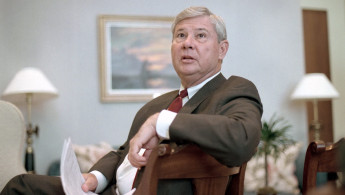Bob Graham, former US senator and Florida governor who opposed Iraq war, dies at 87
Former Florida Sen. Bob Graham, who chaired the Intelligence Committee following the 2001 terrorist attacks and opposed the Iraq invasion, has died. He was 87.
His family announced the death Tuesday in a statement posted on X by his daughter Gwen Graham.
Graham, who served three terms in the Senate, made an unsuccessful bid for the 2004 Democratic presidential nomination, emphasizing his opposition to the Iraq invasion.
But his bid was delayed by heart surgery in January 2003. Never able to gain enough traction with voters to catch up, he bowed out that October. He didn’t seek re-election in 2004 and was replaced by Republican Mel Martinez.
A man of many quirks, Graham perfected the "workdays" political gimmick of spending a day doing various jobs from horse stall mucker to FBI agent. He kept a meticulous diary, noting almost everyone he spoke with, everything he ate, the TV shows he watched and even his golf scores.
But he closed the notebooks to the media during his short-lived presidential bid.
Graham was among the earliest opponents of the Iraq war, saying it diverted America’s focus on the battle against terrorism centred in Afghanistan. He also criticized President George W. Bush for failing to have an occupation plan in Iraq after the US military threw out Saddam Hussein in 2003.
Graham said Bush took the United States into the war by exaggerating claims of the danger presented by the Iraqi weapons of destruction that were never found. Saying Bush distorted intelligence data, Graham argued that was more serious than the sexual misconduct issues that led to President Clinton’s impeachment in the late 1990s.
It spurred Graham to launch his brief presidential bid.
“The quagmire in Iraq is a distraction that the Bush administration, and the Bush administration alone, has created,” Graham said in 2003.
As a politician, few were better. Florida voters hardly considered him the wealthy Harvard-educated attorney that he was.
Graham’s political career spanned five decades, beginning with his election to the Florida House of Representatives in 1966.
He won a state Senate seat in 1970, was elected governor in 1978 and was re-elected in 1982. Four years later, he won the first of three terms in the US Senate when he ousted incumbent Republican Paula Hawkins.
Graham remained widely popular with Florida voters, winning re-election by wide margins in 1992 and 1998 when he carried 63 of 67 counties.
Even when in Washington, Graham never took his eye off the state and the leadership in Tallahassee.
When Gov. Jeb Bush and the Republican-controlled Legislature eliminated the Board of Regents in 2001, Graham saw it as a move to politicize the state university system. He led a successful petition drive the next year for a state constitutional amendment that created the Board of Governors to assume the regents’ role.
Daniel Robert Graham was born Nov. 9, 1936, in Coral Gables where his father, Ernest 'Cap' Graham, had moved from South Dakota and established a large dairy operation. Young Bob milked cows, built fences and scooped manure as a teenager. One of his half-brothers, Phillip Graham, was publisher of The Washington Post and Newsweek until he committed suicide in 1963, just a year after Bob Graham’s graduation from Harvard Law.
In 1966 he was elected to the Florida Legislature, where he focused largely on education and health care issues.
But Graham got off to a shaky start as Florida’s chief executive, and was dubbed "Gov. Jello" for some early indecisiveness. He shook that label through his handling of several serious crises.
As governor, he also signed numerous death warrants, founded the Save the Manatee Club with entertainer Jimmy Buffett and led efforts to establish several environmental programs.
Graham pushed through a bond program to buy beaches and barrier islands threatened by development and also started the Save Our Everglades program to protect the state's water supply, wetlands and endangered species.
Graham also was known for his 408 "workdays," including stints as a housewife, boxing ring announcer, flight attendant and arson investigator.
"This has been a very important part of my development as a public official, my learning at a very human level what the people of Florida expect, what they want, what their aspirations are and then trying to interpret that and make it policy that will improve their lives" said Graham in 2004 as he completed his final job as a Christmas gift wrapper.
After leaving public life in 2005, Graham spent much of his time at a public policy centre named after him at the University of Florida and pushing the Legislature to require more civics classes in the state’s public schools.
Graham was one of five members selected for an independent commission by President Barack Obama in June 2010 to investigate a massive BP oil spill in the Gulf of Mexico that threatened sea life and beaches along several southeastern Gulf states.





 Follow the Middle East's top stories in English at The New Arab on Google News
Follow the Middle East's top stories in English at The New Arab on Google News


